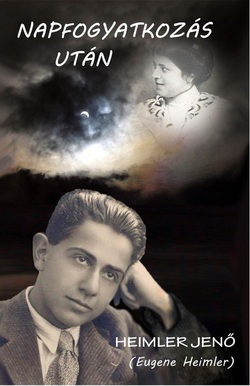
"NAPFOGYATKOZÁS UTÁN”
is a publication of early poetry in Hungarian. It is a tribute to Eugene Heimler, whose poems had first been published weekly in newspapers in Szombathely when he was seventeen and were published under his pen-name “Vát Jenö” in three separate volumes between 1939 and 1946.
Heimler defied his professors of Hungarian literature, who, about the time he wrote and published his poems failed him in Hungarian literature because he was a Jew and because of his revolutionary ideas. These men were fascists! The publisher, who after initial assistance terminated his contract, practically threw him out into the streets without any livelihood.
Antisemitism was very much alive and growing in Hungary.
How does one become a poet?
In his book “A Link in the Chain” Eugene Heimler writes:
“…My mother wanted me to become a poet when I was a child. I sat on her lap one winter evening, and she told me that this was her secret wish …”
“…When I was nine years old, and mother was lying in bed with the illness that killed her in the end … I was frightened that she might die, … and sat down to write the first poem of my life… It was about a just king of Hungary, King Matthias. I waited until she woke, then I sat on her bed and read it to her. ‘It’s beautiful, Jancsi … You are a poet all right …’”
“… When I was fourteen years old, I sat one winter night alone in my little room while doctors fought for mother’s life … and … I sat down then and wrote a poem for her. …While I wrote, my tears fell on the ink … the past was gone, and the good old days … and mother might die … tonight … tomorrow … or in a year’s time? Before the specialist came next day …, I read this poem to her, and said: ‘You promised me once that you would recite my poems one day …’ And to my father’s surprise, she sat up in bed with tears in her eyes and recited the poem to us. I knew then that I should have to write, write a lot, to make her well. But she died when I was seventeen.”
“… She was so happy when I wrote something. Ever since she died I always feel her presence when I have the pen in my hand.”
“… I was so much attached to her, that I have been living a long secret winter night with her … I have lived with her night and day, sitting in her lap long after she died.”
In 2013 a memorial plaque was put up on the house of 11, Kings Street , where the family had lived, commemorating Heimler Jenö.
I am re-publishing these poems for present and future generations to make Eugene Heimler’s poetry eternal and to preserve his legacy forever.
Available from: Amazon.com
back to Home
is a publication of early poetry in Hungarian. It is a tribute to Eugene Heimler, whose poems had first been published weekly in newspapers in Szombathely when he was seventeen and were published under his pen-name “Vát Jenö” in three separate volumes between 1939 and 1946.
Heimler defied his professors of Hungarian literature, who, about the time he wrote and published his poems failed him in Hungarian literature because he was a Jew and because of his revolutionary ideas. These men were fascists! The publisher, who after initial assistance terminated his contract, practically threw him out into the streets without any livelihood.
Antisemitism was very much alive and growing in Hungary.
How does one become a poet?
In his book “A Link in the Chain” Eugene Heimler writes:
“…My mother wanted me to become a poet when I was a child. I sat on her lap one winter evening, and she told me that this was her secret wish …”
“…When I was nine years old, and mother was lying in bed with the illness that killed her in the end … I was frightened that she might die, … and sat down to write the first poem of my life… It was about a just king of Hungary, King Matthias. I waited until she woke, then I sat on her bed and read it to her. ‘It’s beautiful, Jancsi … You are a poet all right …’”
“… When I was fourteen years old, I sat one winter night alone in my little room while doctors fought for mother’s life … and … I sat down then and wrote a poem for her. …While I wrote, my tears fell on the ink … the past was gone, and the good old days … and mother might die … tonight … tomorrow … or in a year’s time? Before the specialist came next day …, I read this poem to her, and said: ‘You promised me once that you would recite my poems one day …’ And to my father’s surprise, she sat up in bed with tears in her eyes and recited the poem to us. I knew then that I should have to write, write a lot, to make her well. But she died when I was seventeen.”
“… She was so happy when I wrote something. Ever since she died I always feel her presence when I have the pen in my hand.”
“… I was so much attached to her, that I have been living a long secret winter night with her … I have lived with her night and day, sitting in her lap long after she died.”
In 2013 a memorial plaque was put up on the house of 11, Kings Street , where the family had lived, commemorating Heimler Jenö.
I am re-publishing these poems for present and future generations to make Eugene Heimler’s poetry eternal and to preserve his legacy forever.
Available from: Amazon.com
back to Home
